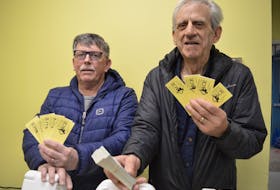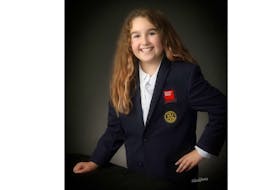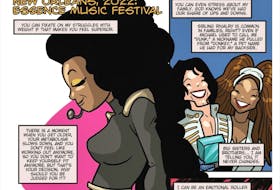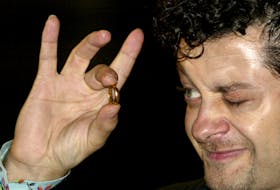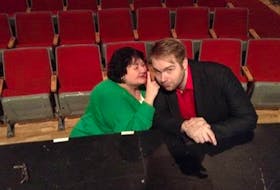Dear Mr. Read,
When sitting next to Lord Cranborne at dinner last night the conversation turned from the problems of Palestine to the problems of Newfoundland. He agreed with my remark that Newfoundland was the “problem child” of the Dominions Office and said that some new steps would have to be taken without much delay. He referred to the considerable interest in the House of Commons in the status of Newfoundland, adding that there was a strong feeling that the present system of commission government over a people of purely British stock was repugnant to a great many members.
— Hume Wrong of External Affairs in a letter to J.E. Read, acting under-secretary of state for External Affairs, written June 6, 1945. Lord Cranborne was Secretary of State for Dominions Affairs of Great Britain
In his new book, “Don’t Tell the Newfoundlanders: The True Story of Newfoundland’s Confederation with Canada,” Greg Malone unravels what he says was a conspiracy to ensure Newfoundland would join Confederation.
It’s a theory that’s been around perhaps since 1949, but Malone has spent four years researching, reading and digging through documents from Ottawa to London, and has uncovered what he says is proof that will change the “official” version of Newfoundland history.
“Whether they rigged the vote or not — which they did, I think, but there’s no hard evidence; the evidence is only circumstantial — they did everything to keep it out of the hands of Newfoundlanders,” Malone says. “The fact that they would give it to them in a referendum was highly unlikely, without controlling the result.”
Malone, actor/director, satirist and author of the memoir “You Better Watch Out,” says he was spurred to write the book by Jim Halley, lawyer and passionate anti-Confederation advocate who remained suspicious about the terms of the union and critical about the process until his death in 2009.
As a junior lawyer at the time of the referendum, Halley formed the Party for Economic Union with the United States with Geoff Stirling, Ches Crosbie and others.
“He was in the law office of the chairman of the National Convention of Newfoundland, J.B. McEvoy, who was being seduced by the confederates to run,” Malone says. “He saw all the letters from everyone going to McEvoy.”
Malone says documents show Britain took over the Newfoundland government to get air superiority, building Gander airport with $5 million in the middle of the Great Depression, and immediately gaining control of the North Atlantic route.
“So they took over Newfoundland. They were supposed to give it back — the contract was as soon as our finances were over, we’d get it back. This was the only country in the world that ever lost their country to debt, and it would never happen today,” Malone says. “They turned us into a dictatorship. Then, when the States poured in all kinds of hundreds of millions and built the largest five bases outside of the States in Newfoundland and then armed the place to the teeth, Roosevelt and Churchill met off the coast, and Roosevelt said to Churchill, ‘They have to go with us or you or Canada. Even though there was going to be a referendum and even though independence would be on the ballot, it would not be allowed to win.’”
Britain intended to hold on to Newfoundland after the war, Malone says, but was hurting so much financially, it made a deal with Canada: Canada would write off Britain’s war debt and give it a loan, and would get Newfoundland in return.
The documents Malone has included in his book include letters between Britain and Canada, peppered with phrases such as, “Don’t tell the people of Newfoundland we’ve been speaking like this,” and “It must never come out in St. John’s that this is our goal.”
The National Convention was set up to add an air of democracy to the process, Malone says.
“They manipulated Joey Smallwood to requesting Confederation and they put sovereignty on the referendum, which was unheard of,” he explains. “The way they did it, they negotiated Newfoundland’s entrance into Confederation; they were the authority and they picked a handful of co-operative Newfoundlanders to make it look good and sent them up there.
“The national convention said no to Confederation like that, absolutely not, but they ignored it completely. There was a huge howl here, but it was right after the war and no one would go against Britain after sacrificing so much. They were depending on our loyalty to do this, and they held their noses and pushed on through — if they didn’t, Newfoundland would go independent and they would have lost control of the whole game.”
The way it was controlled was a smear on the character of Newfoundlanders, Malone says, who were put forth as dependents who needed saving.
“None of it was true. We had lots of money and we didn’t need to be saved by anyone, certainly not Canada. And what were they saving us from? American prosperity? It was a spin and propaganda and all lies.”
Malone says there have been historians before him to examine the documents in bits and pieces, but none have ever put them together, and this is the first time readers will have access to the behind-the-scenes chronology and top-secret letters involving players such as Churchill, Roosevelt, Lester B. Pearson, Lord Beaverbrook and other familiar names.
He’s hoping his book might instigate a renewed interest in Newfoundland history surrounding Confederation, for both locals and the rest of Canada.
“Every Newfoundlander should know this. It’s the real story of your country, of why you are where you are now, why the unemployment rate is where it is, why we have so many people gone away, and why Quebec has the Upper Churchill. It’s all there.”
Malone will officially launch “Don’t Tell the Newfoundlanders” at Christina Parker Gallery on Water Street in St. John’s Tuesday at 7 p.m. The book will be available in bookstores after that.
tbradbury@thetelegram.com
Twitter: @tara_bradbury
Dear Mr. Read,
When sitting next to Lord Cranborne at dinner last night the conversation turned from the problems of Palestine to the problems of Newfoundland. He agreed with my remark that Newfoundland was the “problem child” of the Dominions Office and said that some new steps would have to be taken without much delay. He referred to the considerable interest in the House of Commons in the status of Newfoundland, adding that there was a strong feeling that the present system of commission government over a people of purely British stock was repugnant to a great many members.
— Hume Wrong of External Affairs in a letter to J.E. Read, acting under-secretary of state for External Affairs, written June 6, 1945. Lord Cranborne was Secretary of State for Dominions Affairs of Great Britain
In his new book, “Don’t Tell the Newfoundlanders: The True Story of Newfoundland’s Confederation with Canada,” Greg Malone unravels what he says was a conspiracy to ensure Newfoundland would join Confederation.
It’s a theory that’s been around perhaps since 1949, but Malone has spent four years researching, reading and digging through documents from Ottawa to London, and has uncovered what he says is proof that will change the “official” version of Newfoundland history.
“Whether they rigged the vote or not — which they did, I think, but there’s no hard evidence; the evidence is only circumstantial — they did everything to keep it out of the hands of Newfoundlanders,” Malone says. “The fact that they would give it to them in a referendum was highly unlikely, without controlling the result.”
Malone, actor/director, satirist and author of the memoir “You Better Watch Out,” says he was spurred to write the book by Jim Halley, lawyer and passionate anti-Confederation advocate who remained suspicious about the terms of the union and critical about the process until his death in 2009.
As a junior lawyer at the time of the referendum, Halley formed the Party for Economic Union with the United States with Geoff Stirling, Ches Crosbie and others.
“He was in the law office of the chairman of the National Convention of Newfoundland, J.B. McEvoy, who was being seduced by the confederates to run,” Malone says. “He saw all the letters from everyone going to McEvoy.”
Malone says documents show Britain took over the Newfoundland government to get air superiority, building Gander airport with $5 million in the middle of the Great Depression, and immediately gaining control of the North Atlantic route.
“So they took over Newfoundland. They were supposed to give it back — the contract was as soon as our finances were over, we’d get it back. This was the only country in the world that ever lost their country to debt, and it would never happen today,” Malone says. “They turned us into a dictatorship. Then, when the States poured in all kinds of hundreds of millions and built the largest five bases outside of the States in Newfoundland and then armed the place to the teeth, Roosevelt and Churchill met off the coast, and Roosevelt said to Churchill, ‘They have to go with us or you or Canada. Even though there was going to be a referendum and even though independence would be on the ballot, it would not be allowed to win.’”
Britain intended to hold on to Newfoundland after the war, Malone says, but was hurting so much financially, it made a deal with Canada: Canada would write off Britain’s war debt and give it a loan, and would get Newfoundland in return.
The documents Malone has included in his book include letters between Britain and Canada, peppered with phrases such as, “Don’t tell the people of Newfoundland we’ve been speaking like this,” and “It must never come out in St. John’s that this is our goal.”
The National Convention was set up to add an air of democracy to the process, Malone says.
“They manipulated Joey Smallwood to requesting Confederation and they put sovereignty on the referendum, which was unheard of,” he explains. “The way they did it, they negotiated Newfoundland’s entrance into Confederation; they were the authority and they picked a handful of co-operative Newfoundlanders to make it look good and sent them up there.
“The national convention said no to Confederation like that, absolutely not, but they ignored it completely. There was a huge howl here, but it was right after the war and no one would go against Britain after sacrificing so much. They were depending on our loyalty to do this, and they held their noses and pushed on through — if they didn’t, Newfoundland would go independent and they would have lost control of the whole game.”
The way it was controlled was a smear on the character of Newfoundlanders, Malone says, who were put forth as dependents who needed saving.
“None of it was true. We had lots of money and we didn’t need to be saved by anyone, certainly not Canada. And what were they saving us from? American prosperity? It was a spin and propaganda and all lies.”
Malone says there have been historians before him to examine the documents in bits and pieces, but none have ever put them together, and this is the first time readers will have access to the behind-the-scenes chronology and top-secret letters involving players such as Churchill, Roosevelt, Lester B. Pearson, Lord Beaverbrook and other familiar names.
He’s hoping his book might instigate a renewed interest in Newfoundland history surrounding Confederation, for both locals and the rest of Canada.
“Every Newfoundlander should know this. It’s the real story of your country, of why you are where you are now, why the unemployment rate is where it is, why we have so many people gone away, and why Quebec has the Upper Churchill. It’s all there.”
Malone will officially launch “Don’t Tell the Newfoundlanders” at Christina Parker Gallery on Water Street in St. John’s Tuesday at 7 p.m. The book will be available in bookstores after that.
tbradbury@thetelegram.com
Twitter: @tara_bradbury


